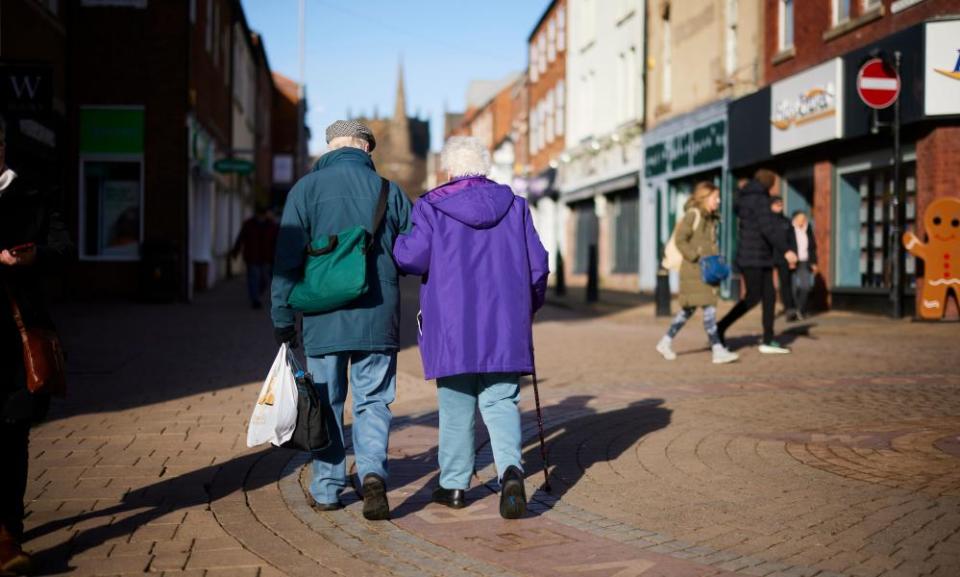West Lancashire byelection: Labour odds-on favourite to hold seat

West Lancashire constituents will vote for their next MP on Thursday in a Westminster byelection triggered by the resignation of Labour’s Rosie Cooper.
Cooper announced she was stepping down last autumn after more than 17 years, after being targeted in a rightwing plot in 2017 in which a 23-year-old extremist had planned to “replicate” the murder of Jo Cox using a machete.
The former MP, who had a majority of 8,000, said events of the last few years had “undoubtedly … taken their toll”, and she has since accepted the post of chair of Mersey Care NHS foundation trust.
Despite Cooper’s experience, the Labour candidate, charity worker Ashley Dalton, said the potential threats to her safety had not deterred her from running for MP.
“Obviously we take it seriously and you have to be sensible about mitigating some of those risks, but it doesn’t put me off or scare me in any way,” she said. “I’m a gay woman that’s been involved in politics for about 20 years so I’ve been on the receiving end of some pretty unsavoury comments and abuse. But that abuse is aimed almost entirely at shutting me up and I’m not going to do that.”
According to the bookies, Labour is 1/25 to retain the West Lancashire seat it has held since 1992, but the party has sent shadow frontbenchers, including Lucy Powell and Lisa Nandy, to the constituency to try to ensure a comfortable victory.
Dalton was brought up in Leyland, South Ribble, on the north border of the constituency and has worked in local government for the past 30 years. Until the campaign started, she worked part-time for a Lancashire charity and speaks about grassroots activism with enthusiasm. Her plan focuses on providing support for constituents during the cost of living crisis, improving local NHS services and bringing more police on to the streets.
This week, Dalton was campaigning in Skelmersdale, a new town developed in the 1960s with a population of 38,813. Known to residents as Skem, the town is the largest in the West Lancashire constituency, joined by Ormskirk, Burscough and a cluster of smaller settlements and villages, many of which have ties to farming and agriculture. Despite its size and the vast swaths of land that surround it, Skelmersdale does not have a train station and residents have said bus services are few and far between.

Poor public transport is “a huge issue” for people locally, according to Dalton. “Transport services over the last 10 years or so have just been completely decimated in this area,” she said. “Skelmersdale has some of the lowest car ownership in the country yet some of the worst public transport. People feel trapped.”
Waiting in line for a taxi outside the Concourse shopping centre, teacher Toni Sumner said that having a train station in the area would be “life-changing”, giving local people access to new opportunities in education and labour. But she believes the prospect, pledged by both Cooper and Dalton, is unlikely. “It’s never gonna happen. I don’t think anyone will be able to bring that.”
Though she does not know much about the new candidate, Sumner will “absolutely” be voting for Labour on Thursday. She has always voted for the party and with the recent shop closures and limited facilities in mind, she believes it is crucial “to have a voice in parliament that maybe has some idea about what people are having to cope with here in Skem”.

The Labour party is currently running at 50% in the wider UK polls. Politics on a national scale has helped to shape the decision of West Lancashire constituents such as Anne Tilley, a retired care worker living in Ormskirk, who has turned away from the Conservatives for the first time in several years and submitted a postal vote for Labour instead.
“I can’t stand any more what the Conservatives have been doing. You can’t trust them, I’ve lost faith in them altogether,” she said.
“One minute they’re here, next they’re gone, then you hear they’re getting loads of money for this and that and we’re still left on the same old pension. £178 a week I get. That’s not enough.”
Tilley doesn’t know whether a Labour government will bring about change, but she has her fingers crossed. “I’d like to see if we get anything better because at the moment the world’s upside down.”
West Lancashire has long been considered a safe Labour seat. However, many people on the high street in Ormskirk said they either did not know the byelection was taking place, did not plan on voting or did not feel confident in making a decision.
Also standing is the Conservative candidate, Mike Prendergast. Though Prendergast has been canvassing around the constituency, he has not been joined by high-profile MPs.
Jenny, 56, has lived in Ormskirk all her life and has always voted Conservative. “My dad was a staunch Tory, you couldn’t really live in the house if you weren’t going to vote for them,” she said. For the first time, however, Jenny is torn between Conservative and Labour, which her two daughters vote for.
“I don’t really feel represented by either. I think the party leaders have too much money, and I don’t think they’re living in the real world. I’ve never seen them face to face. I only see the things they put through the post, so I don’t really have much of a rapport with them. I’m in the middle but I’m possibly leaning towards Labour. I’m just trying to do something to help my children.”

 Yahoo Movies
Yahoo Movies 
